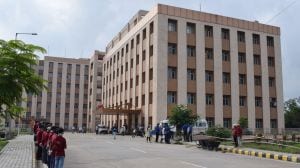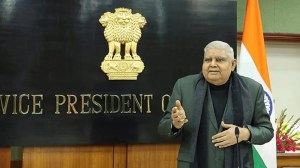A year of relaxation in prohibition law: 700 got permits to drink inside GIFT City
A four-member facilitation committee headed by the Additional Chief Secretary (home), the Managing Director and CEO of GIFT City, Gandhinagar District Collector and Director, Prohibition, as the member-secretary was appointed to issue the wine and dine permits.
 Since 1960, Gujarat which has been under a strict anti-drinking law — including an imprisonment of up to three years — relaxed the Gujarat Prohibition Act, 1949. (Source: Pexels)
Since 1960, Gujarat which has been under a strict anti-drinking law — including an imprisonment of up to three years — relaxed the Gujarat Prohibition Act, 1949. (Source: Pexels)At least 700 drinking permits have been issued to the employees working in the Gujarat International Finance-Tec City (GIFT) companies in the last year since the Gujarat Prohibition Act was relaxed, top sources told The Indian Express. The regular health permits issued to residents of the state under the dry law average around 40,000 a year, which allows them to drink after they turn 40 years of age, while the eligibility for drinking inside GIFT City is 21 years.
Since 1960, Gujarat which has been under a strict anti-drinking law — including an imprisonment of up to three years — relaxed the Gujarat Prohibition Act, 1949, to allow wine and dine facilities and drinking permits for guests and employees of companies in GIFT City, in the run-up to the 10th edition of the Vibrant Gujarat Global Summit (VGGS), held in January last year.
A four-member facilitation committee headed by the Additional Chief Secretary (home), the Managing Director and CEO of GIFT City, Gandhinagar District Collector and Director, Prohibition, as the member-secretary was appointed to issue the wine and dine permits.
“The employee permits are issued following recommendations from the human resource departments of companies,” said a source.
The drinking permit, called the ‘Liquor Access Permit’ (LAP), is exclusive to GIFT city, and is issued by the GIFT City administration keeping the Prohibition and Excise (P&E) department in the loop. GIFT City business district has around 670 companies which include offices of Google, Bank of America, Oracle, IBM, Standard Chartered and others, employing nearly 25,000 people, said a top official.
Among the projects coming up in the smart city are Mumbai’s 300-bed Lilavati Hospital, a hotel by the Hyatt Group, a Central Park, and top notch real estate companies building office and residential spaces.
A senior official familiar with the matter described the relaxation as a “box ticked” for GIFT City. “703 liquor access permits are active at the moment,” the senior official told The Indian Express on the condition of anonymity. The permits issued for a fee of Rs 2000 for two years are cancelled once the employee stops working in GIFT City offices.
Repeated demands
The relaxation decision came after months of deliberations following repeated demands by national and international investors and visitors to make it on par with other international economic zones. “It seemed to be kind of an obstacle to the Ease of Doing Business status of the dry state,” the official said.
For the rest domiciled in Gujarat and seeking to drink legally, there are two kinds of health permits — one for those who are between 40-65 years, and those above 65 years. There is a third category of health permits for those non-Gujaratis who are above 65 years of age.
Visitors, tourists and foreigners have the privileges of the less stringent non-health permits which are temporary.
The GIFT city has two hospitality properties, the Grand Mercure hotel and the GIFT City club, a premium business club, which are the only two places in Gujarat with wine and dine permits, where the employees or guests of GIFT city are allowed to drink.
The exemption in the prohibition law within the limits of GIFT City, spread over four square kilometres, came into effect on December 30, 2023, allowing for the first time in the state the FL-III licence “to serve liquor at the approved area”.
The FL-III is a provision in the Gujarat Prohibition Act 1949, that allows liquor to be served in wine and dine facilities
This would include establishments such as clubs, hotels, restaurants and office canteens.
Temporary permits valid for a day were also allowed for the guests of employees to drink only in these ‘wine and dine’ areas if accompanied by a Liquor Access Permit holder.
An establishment can get a FL-III license for one year to a maximum of five years initially, on payment of an annual fee of one lakh rupees and a security deposit of two lakh rupees.
While the relaxation in the anti-drinking law was meant to make GIFT City attractive to businesses, a top official associated with the new permit procedures told this paper, “Consuming liquor is an expensive affair in GIFT City, given that the cost of liquor in Gujarat is higher than other states, and drinking in the wine and dine facility means paying for the premium service”.
Figures speak
Data shared by the Prohibition & Excise (P&E) Department with The Indian Express showed that the number of active drinking licences till December 31, 2024 was 61,260, of which the health permits were 45,187 and the excise revenue earned in the financial year 2023-24, (till December) stood at Rs 142.06 crore.
As of now, 77 hotels and independent units are permitted to legally sell liquor from shops in their premises to the permit holders. According to the data, the annual health permits comprise over 70% of all active permits issued.
Non-health permits issued to non-Gujarat residents and foreigners have remained more or less consistent, barring the pandemic years (2020 and 2021). In 2024, 3,661 temporary permits were issued to those with residential permits, including foreigners, 4,569 seven-day permits were issued to visitors and 7,843 permits valid for one month were issued to foreign tourists.
“Non-health permits increased from August 2022 onwards. There was no regulatory or policy change from the state, nor was there any disruption in issuance of non-health permits, except during Covid-19,” a Prohibition Department official told The Indian Express.
Gujarat has been a dry state since it separated from the Bombay Province in 1960. Residents and visitors need permits — health (for reasons ranging from ‘stress’ to heart ailments) and non-health (temporarily issued to non-Gujarat residents and foreigners to promote business and tourism) — to purchase foreign liquor from licensed vendors across Gujarat.
Ahmedabad-based hotelier Narendra Somani, who is also the President of the Hotel and Restaurant Association, Gujarat sees the relaxation in GIFT City as a “gimmick” and argues how the price of liquor in Gujarat is a deterrent to drinking. “The VAT (Value Added Tax) on Indian-made foreign liquor (IMFL) in Gujarat is 65% which is very high compared to other states, and the excise duty is also almost double”.
A bottle that costs Rs 2,500 in other states, costs Rs 7,500 in Gujarat as VAT in other states range between 5% and 15%, Somani said.
(With inputs from Sohini Ghosh)












